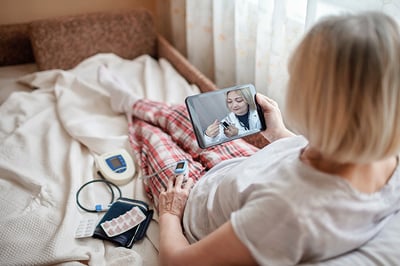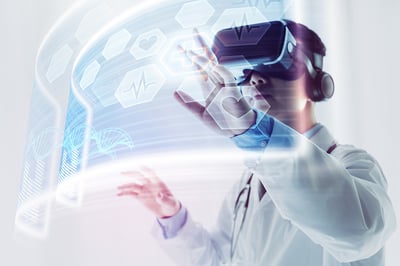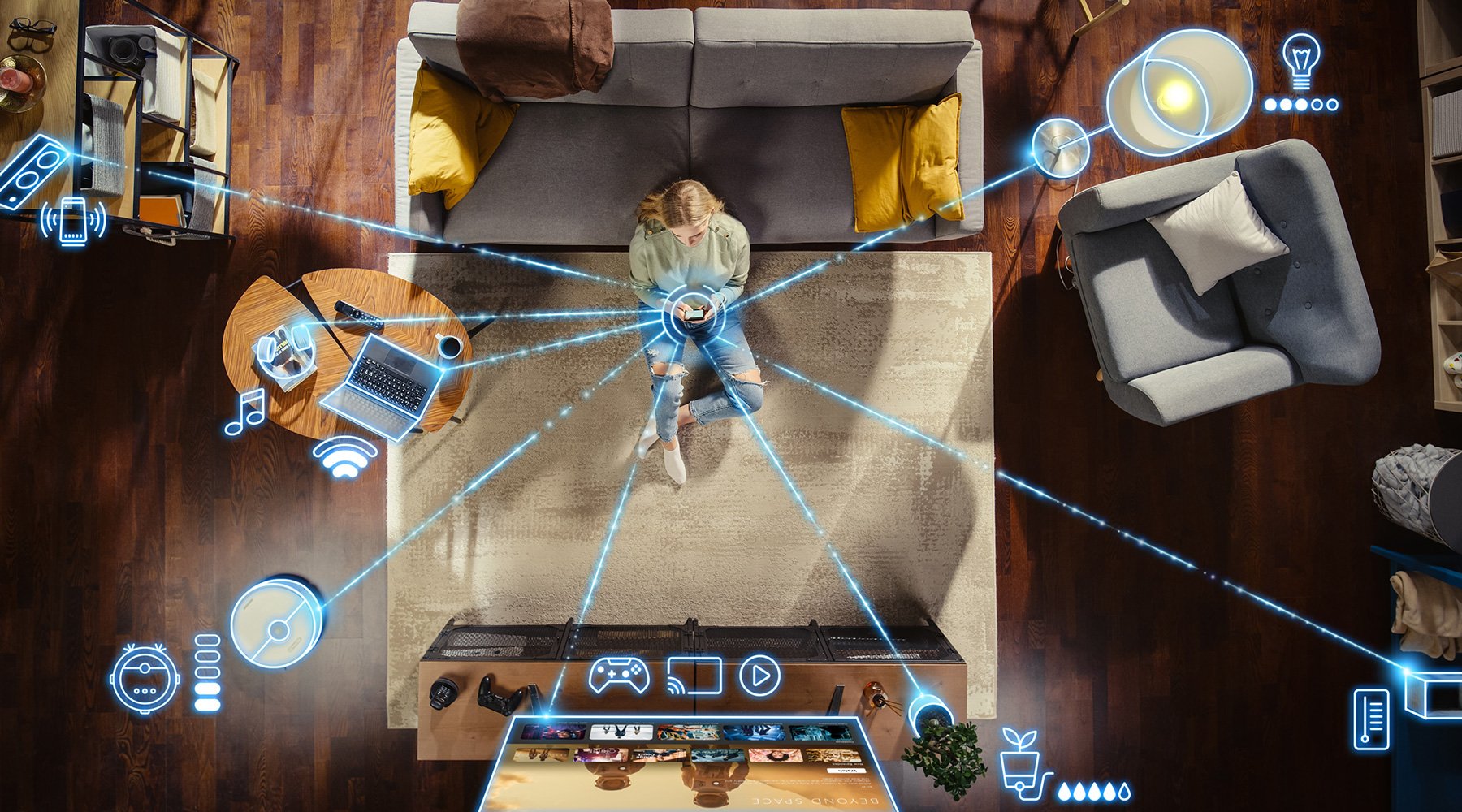The healthcare landscape in 2024 is poised for significant transformation driven by technological advancements and a focus on further improving the patient experience. Understanding how technology can help to improve the patient journey, comes down to understanding the patient’s experience in each stage of their illness, outlining all professional and non-professional stakeholders, including family, involved in the care process, and figuring out their needs, challenges, and frictions. When you have a deep understanding of the journey, you can start thinking of how to apply solutions that will improve quality, accessibility, and means to empower patients as much as possible and drive proactive care.
For 2024 further optimisation and personalisation per target group and age group is expected in every aspect of healthcare. The focus will be on accessibility, for example the ease-of-use of technology in the home setting, predominantly in the elderly group. The further rollout of 5G networks is expected to enhance connectivity and support the increased data transfer requirements of various digital healthcare applications, such as remote monitoring devices, complex diagnostic models, and handheld imaging.
 Remote Patient Monitoring (RPM)
Remote Patient Monitoring (RPM)
RPM leverages technology such as wearable devices and sensors to remotely monitor patients' health parameters in real-time. This continuous monitoring enables early detection of health issues and proactive interventions, leading to improved patient outcomes and reduced healthcare costs. Focus on ease of use and quality of data.
Artificial Intelligence (AI) and Machine Learning (ML)
AI and ML algorithms are revolutionising healthcare by aiding in diagnostics, treatment planning, and predictive analytics. These technologies enable personalised care plans tailored to individual patient needs, ultimately enhancing the efficacy and efficiency of healthcare delivery.
Digital therapeutics
Digital therapeutics offer software-based interventions for managing various medical conditions, complementing traditional treatment methods. These solutions leverage digital platforms to deliver evidence-based therapies, empowering patients to take an active role in managing their health. In 2024 the focus will be on validation and reimbursement of the solutions. Read more here.
Blockchain in healthcare
Blockchain technology holds promise in ensuring the security and integrity of healthcare data exchange. By providing a tamper-proof and transparent system for storing and sharing patient information, blockchain enhances data privacy and interoperability across healthcare networks.
 Virtual Reality (VR) and Augmented Reality (AR)
Virtual Reality (VR) and Augmented Reality (AR)
VR and AR technologies are reshaping medical training, patient education, and therapeutic interventions. These immersive technologies enable healthcare professionals to simulate complex procedures, educate patients about their conditions, and alleviate pain and anxiety during treatment. Focus on education for professionals and further development for treatment of chronic pain and psychological disorders, and rehabilitation.
IoT in healthcare
The IoT ecosystem in healthcare facilitates the seamless integration of medical devices and systems, enabling real-time monitoring and data collection. IoT-enabled solutions enhance patient care by providing healthcare providers with actionable insights and facilitating remote patient management.
Chatbots and virtual health assistants
Gen AI-driven chatbots and virtual assistants are enhancing patient engagement and streamlining healthcare delivery. These virtual agents provide timely information, assist in scheduling appointments, and offer support for managing chronic conditions, improving access to care and patient satisfaction.
 Personalised medicine
Personalised medicine
Advances in genomics and data analytics enable personalised treatment approaches based on individuals' genetic profiles and health data. By tailoring interventions to specific patient characteristics, personalised medicine maximises treatment efficacy and minimises adverse effects. Cell and gene therapies will continue to enter the market, just as governments will struggle with reimbursement Data is in many ways the lifeblood of pharmaceutical industry. With new developments such as genomics, molecular profiling, biomarkers and patient monitoring devices more data sets are being generated than ever before.
Cybersecurity in healthcare
With the increasing digitisation of healthcare data, cybersecurity is paramount to safeguard patient information and prevent data breaches. Healthcare organisations are investing in robust cybersecurity measures to protect sensitive data and maintain trust in healthcare systems.
 Gamification in healthcare
Gamification in healthcare
Gamification in the healthcare industry involves applying game design principles and mechanics. Gamification holds significant potential to improve engagement, motivation, and behaviour change in healthcare settings. By leveraging the intrinsic human desire for challenge, achievement, and social interaction, gamified interventions have the power to transform healthcare delivery and empower individuals to lead healthier lives. Learn more about gamification in healthcare.
Overall, these trends signify the focus on patient-centered care, driven by technological innovation and a commitment to improving health outcomes and experiences for individuals across diverse healthcare settings.
As an expert in digital healthcare and organizational excellence, Teun Schutte is the Managing Consultant of Digital Strategy Healthcare, Mobiquity. Teun has an established career in healthcare, with a specialism in respiratory health. Beginning his career at GlaxoSmithKline, he spent over 13 years at the organization and worked across 6 different roles. Teun joined the company as a Clinical Research Manager and rose through the ranks to become the Head of Sales and Marketing for Respiratory. Teun has worked on developing digital health solutions, such as the deployment of the MyAsthma application, a COPD coach, and he was integral to the transformation of GSK towards empowerment and digitalization. In 2015 Teun completed Nyenrode Business University in Amsterdam in Healthcare Innovation and Management which further strengthened his expertise in health innovation. Teun joined Mobiquity in 2016 to strengthen the team with his healthcare strategy and digital experience. He has worked with the Princess Maxima Center for Pediatric Oncology to redefine the patient pathway from the perspective of the family. He created a digital assistant for pain management and worked in many more disease areas to design and validate digital opportunities, always with delivering value to all users value in mind. In his free time, Teun undertakes voluntary work for the Personalised Healthcare Catalyst Alliance where he has created multi-stakeholder journeys and projects for rheumatoid arthritis and depression, such as “HelpYourFriendsHelp” - a project which activates the social network for people with mental challenges. He is also a volunteer for “Het Longfonds” – a Dutch non-profit which tackles chronic lung diseases. Teun is an authority on using digital technologies to create human-centric healthcare solutions, multi-stakeholder design, respiratory healthcare solutions, realigning the patient pathway from various stakeholder perspectives, and reimagining financial well-being as part of every healthcare strategy.
